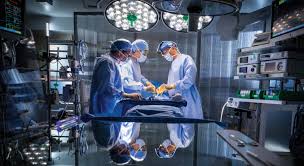OneMedicine | Private GP | Birmingham

What is Presurgical Optimisation?
Presurgical optimisation means reviewing your overall health before an operation and making any necessary adjustments to reduce risk and support recovery. Whether it’s a minor procedure or major surgery, being well-prepared can make all the difference.
Why Is It Important?
Taking steps to prepare before surgery offers many benefits:
- Reduces the risk of complications during or after the operation
- Shortens recovery time and helps you feel better, faster
- Improves safety during anaesthetic and surgery
- Gives you confidence and a clear understanding of what to expect
What Does It Involve?
Presurgical optimisation is tailored to your individual needs, but it often includes:
- Reviewing your medical history and medications
Before any surgery, we take time to understand your full medical background. This includes:- Any previous operations or hospital stays
- Current or past conditions such as high blood pressure, diabetes, asthma, heart disease, or mental health concerns
- Allergies, including reactions to medications or anaesthetics
- Your current medications – including prescriptions, over-the-counter treatments, supplements, and herbal remedies
- A thorough physical examination
We’ll perform a focused examination to assess your overall health and fitness for surgery. This may include:- Checking your heart and lungs
- Measuring blood pressure, pulse, oxygen levels and weight
- Assessing mobility, frailty, or muscle strength, especially in older patients
- Looking for any signs of infections, swelling, wounds, or anaemia
- Identifying any other physical issues that may affect your surgery or recovery
This in-person assessment is a vital part of understanding how your body may respond to anaesthesia and surgery, and allows us to tailor your care accordingly.
- Blood tests
These check for anaemia, kidney and liver function, blood sugar levels, and signs of infection. - Cardiac tests, especially for people with heart conditions, high blood pressure, or those having major surgery:
- ECG (Electrocardiogram): Records your heart’s rhythm and electrical activity.
- Echocardiogram: Uses ultrasound to check how well your heart pumps and whether the valves are working properly.
- Angiography (CT or conventional): Looks for any narrowing or blockages in your heart’s blood vessels.
- Exercise Stress Test (Treadmill Test): Assesses how your heart performs under strain, helping us guide your anaesthetic and surgical plan.
- Cardiac biomarkers: Blood tests such as NT-proBNP or troponin may be used in selected cases to assess heart function or risk.
- Lung function tests
These assess how well your lungs are working – particularly important if you have asthma, COPD, or are having chest or abdominal surgery.
A common test is:- Spirometry: A simple breathing test that measures how much air you can breathe out and how fast. It helps detect conditions like asthma or chronic bronchitis and allows us to adjust your treatment plan or anaesthetic approach if needed.
- Optimising chronic conditions
Many people have long-term health issues that, if not well controlled, can increase the risks associated with surgery. As part of your presurgical preparation, we focus on making sure these conditions are as stable and well-managed as possible. This includes:- Diabetes: Keeping blood sugar levels within a safe range reduces the risk of infections and helps wounds heal better after surgery. We may adjust your medications and advise on diet and monitoring before and after your operation.
- High Blood Pressure: Controlling blood pressure lowers the chance of heart complications during and after surgery. We ensure your treatment is effective and may make adjustments as needed.
- Asthma or COPD: Optimising your lung health can reduce breathing problems related to anaesthesia and speed up your recovery. This might involve reviewing inhalers, medications, and avoiding triggers.
- Heart Conditions: Conditions like heart failure, arrhythmias, or valve problems need close monitoring and management to reduce risks during surgery.
- Kidney or Liver Disease: We assess how well these organs are working and adjust treatments to avoid complications.
- Other Conditions: Thyroid disorders, anemia, obesity, and mental health conditions are also reviewed and managed as needed to support your safety and recovery.
- Lifestyle support
Advice on quitting smoking, improving physical activity, and nutrition – all of which support better healing and outcomes. - Anaesthetic review and consent
Planning the safest type of anaesthetic for your needs, and ensuring you understand what to expect.
How This Approach Helps Anticipate Problems
One of the biggest strengths of presurgical optimisation is its proactive nature. Rather than waiting for issues to arise during or after surgery, we aim to spot and address them early:
- Identify hidden risks such as silent heart disease or unstable blood pressure
- Adjust treatment or medications ahead of time to reduce surgical risk
- Plan the safest anaesthetic based on your full health picture
- Prevent delays or cancellations by catching concerns before the day of surgery
- Coordinate with your surgeon if anything needs to be adapted in the surgical plan or aftercare
This forward-thinking approach helps avoid complications, makes surgery safer, and gives you peace of mind.
Our Approach at OneMedicine
Led by experienced doctors, our team takes a calm, thorough and personalised approach. We work closely with you – and, if needed, your surgeon – to ensure every box is ticked before your procedure. Our goal is to help you feel well-informed, confident, and in the safest hands possible.
Ready for Surgery – the Right Way
Presurgical optimisation gives your body the best chance to handle surgery and bounce back quickly. It’s a small investment of time that pays off in safer care and better outcomes.
Thinking about surgery or already referred?
We’re here to support you every step of the way.
















